Explore the different types of peccaries found in Costa Rica, as well as their importance in the local ecosystem, habitats, behavior, and social structure.
GVI
Posted: May 10, 2023

Posted: March 13, 2019
Taking the leap
If you had told me this time last year that I would be completely in love with South Africa and never wanted to leave, I’d have been skeptical.
I discovered GVI several years ago and while I wanted to join a program, I had a full time job as a primary school teacher. Soon the pull of travelling abroad was too much, so I said goodbye to my classroom, packed my bags and shipped off to Karongwe Private Game Reserve for the 6 month wildlife conservation internship. At 27 years old, I left behind my family, friends and dog and went travelling by myself for the first time in my life.
I knew within 2 weeks that this was where I wanted to be. The living was basic, the internet was iffy and the sun baked the ground…it was perfect.
Training to work as a research conservationist
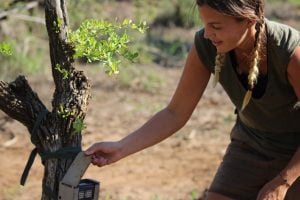
The first week was a complete whirlwind of information. We learned how to use the telemetry equipment, how to input data, how to correctly check the vehicles, how to use the radios in an emergency, about all of the mammals that we have on the reserve and which ones we focus on and why.
It was incredibly overwhelming for me; I was one of the only interns who didn’t have some sort of experience or degree in wildlife/conservation/animal care. How was I supposed to know how to use a GIS mapping program?
But the staff were incredible with the training; if something needed clarification they would help you out. If you aren’t sure which fluids to check in the car they will point them out. If you are completely lost while doing navigation (which I frequently was, terrible sense of direction) they would guide you to the correct place to ensure you are learning, rather than just give you the answer.
On to the exciting stuff!
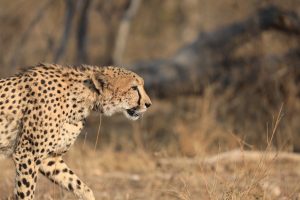
Probably the main reason that all of us come to GVI Karongwe, whether as 6 month interns or 2 week volunteers, is to see the amazing African animals in their natural habitat. And going on 2 drives everyday for three months is going to guarantee you some pretty amazing sightings of the animals.
I had been on drive when the elephant herd has come right up to the car, seen cheetah get stuck up a tree, witnessed leopard cubs taking their first steps into the big wide world, and had front row seats to male rhinos fighting over a female! To say that this place and these experiences have changed my life would be an understatement.
But it isn’t always Big Five Drives and cat-tricks, we are a research base, and we have work to do. Most importantly with our cheetahs and lions, who are our main focus animals. This means that everyday finding these animals is our main priority; to track their movements, behavior, kill utilisation and inter-species competition. It’s pretty cool seeing these incredible endangered animals everyday, you begin to learn the individual personalities of the cats and watch as they fight to survive. One of the most rewarding experiences for me personally was watching and following one of our lionesses who was pregnant. To see her grow over the course of three months was amazing! I was also extremely fortunate in the fact that I was still around when she gave birth and got to see the cubs at 6 weeks old!
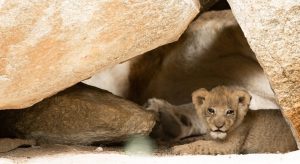
Below are some unbelievable experiences that myself and others have had while here on Karongwe:
Intern specifics
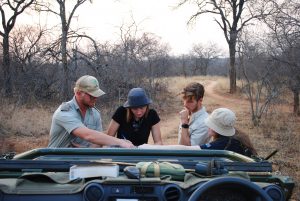
As an intern, there are a few extras that can be learned and experienced. As this is considered a program to help you develop your career, we were given a lot of lectures to help us better understand our roles here. Not only on nature (with lectures and assignments on insects, birds, mammals, tracking, trees etc) but also on issues and topics which surround wildlife, such as game counting, animal translocation, population control, and perhaps most surprisingly, trophy hunting and the way it has a positive affect on wildlife conservation.
We work closely with the staff as they train and teach us to become conservationists. Learning the science behind the constant data collection and focus studies, understanding how every animal plays a wider role to the ecology of their habitat, and even the general management of the base. We assist on projects such as hyena identification and studies to find the best way to deter our elephants from breaking our of the reserve. These are all very important as when the three months at Karongwe is done, we are sent as fully trained individuals to our work placements.
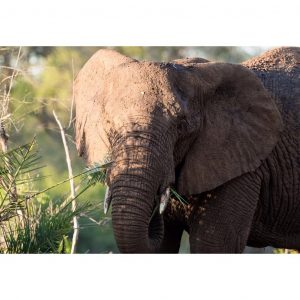
Leaving the comfort of my full-time job, my home and everything that was familiar to me was one of the scariest moments of my life. I was jumping into the complete unknown. All of my family, friends and colleagues thought I was crazy. But these past 6 months have been the most rewarding, the most exhilarating, and the most eye-opening of my life. They have reminded me of my childhood passion for working with animals, something I forgot along the way. They showed me that while I loved being a primary school teacher, I gain so much joy out of teaching people who are passionate about conservation. Most importantly, they have shown me that this is where I want to be, this is where I belong. I’m already planning to move out here by next year to attend the year’s safari guiding course offered by Bushwise (a sister company with GVI).
Explore the different types of peccaries found in Costa Rica, as well as their importance in the local ecosystem, habitats, behavior, and social structure.
GVI
Posted: May 10, 2023